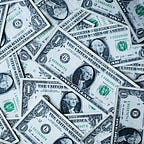Earn Income from Your Savings
This isn’t an article about how to save money by discontinuing that daily latte to save $4.50 per day. Now, if you are struggling paycheck to paycheck, this would be helpful. However, this won’t substantially affect your savings or retirement account. But there is something you can do with that $4.50 a day that will noticeably impact your savings!
If you were to put $4.50 a day in a savings account, you will have saved $1,298 in a year. That’s a meager return of $128 at one-half of one percent per year! A much better plan is placing those funds in a high-yield ETF or CEF.
Several funds provide monthly returns rather than quarterly stock dividends and can be as much as 1% per month versus a savings account of .5% per year. For example, if you took that daily cup of coffee and invested in an ETF such as Global X Nasdaq 100 Covered Call ETF (QYLD), your first-year total would be $1,608 instead of the original $1,298.
What if you started with a small account of $1,250? If you consistently add the original coffee savings, you will nearly triple your initial investment to $3,708 after the first year. And this isn’t linear growth.
If you are in your twenties and continue to do this every month and increase the amount saved when you can, your returns will increase…
